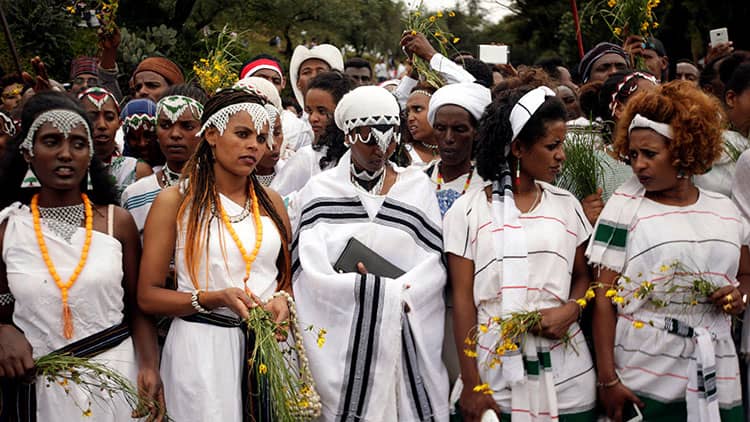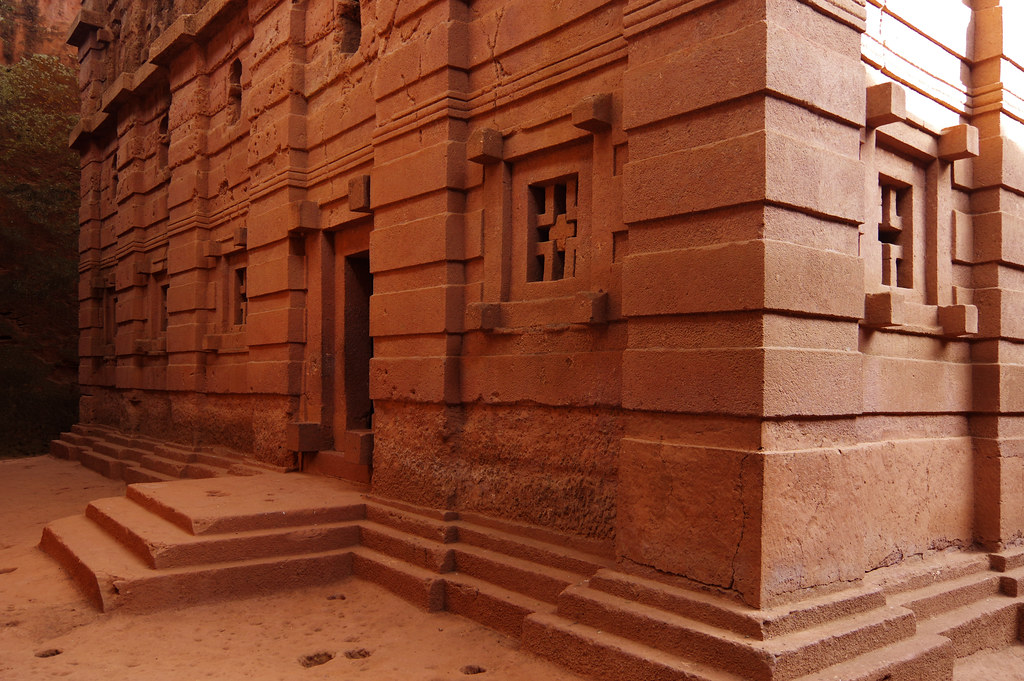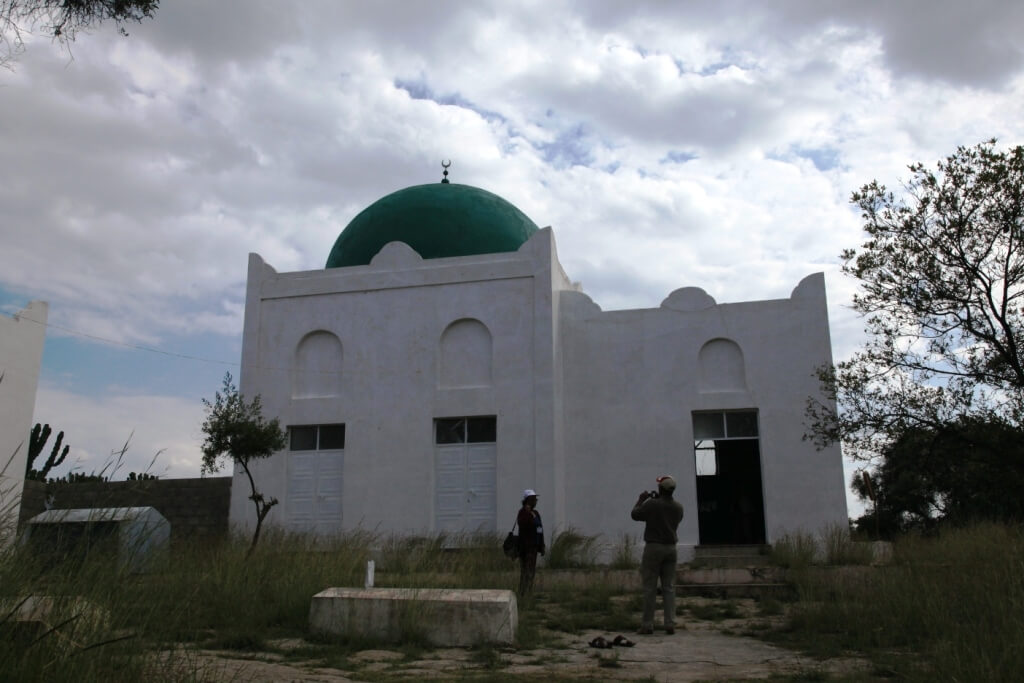- Home
- Exploring Addis Ababa – Things to know before you go
Exploring Addis Ababa - Things to know before you go
Discover the vibrant charm of Addis Ababa, the capital and largest city of Ethiopia. Uncover the rich culture and history at the center of the country.
Addis Ababa, the bustling city of Ethiopia, is not only the capital of the country but also a hub of culture, history, and politics. Known for its diverse population and vibrant atmosphere, Addis Ababa is a melting pot of Ethiopian traditions and modern influences. As the political and economic center of Ethiopia, Addis Ababa plays a crucial role in shaping the country’s future. From its bustling markets to its historic landmarks, Addis Ababa offers visitors a glimpse into the rich tapestry of Ethiopian life. Explore the city of Addis Ababa and discover all that this dynamic capital has to offer.
History of Addis Ababa
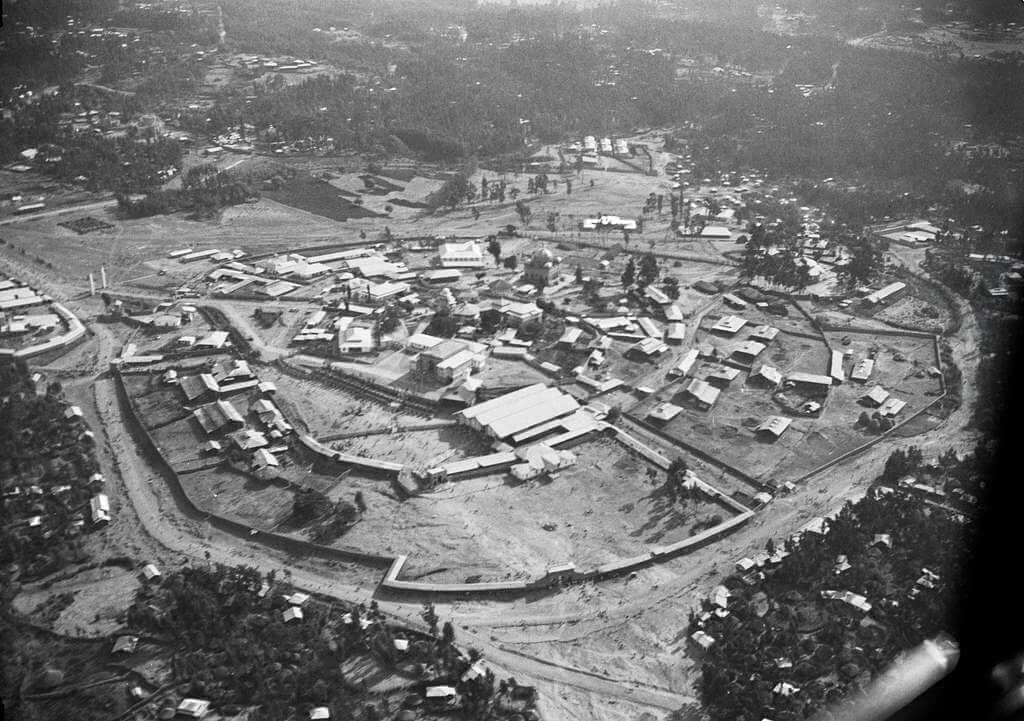
The Founding of Addis Ababa
Addis Ababa, the bustling capital city of Ethiopia, was founded in 1886 by Emperor Menelik II and his wife, Empress Taytu Betul. The city’s name, which means “new flower” in Amharic, reflects its rapid development and significance as a hub of Ethiopian culture and governance. Situated at the base of the Entoto Mountains, the location was chosen for its strategic advantages, including its proximity to natural resources and a favorable climate. Initially serving as a military base, Addis Ababa quickly grew into the political and economic heart of Ethiopia.
Addis Ababa through the Ages
Since its founding, Addis Ababa has undergone significant transformations, evolving into a dynamic metropolis that blends historical heritage with modern advancements. The early 20th century saw the city expand with the construction of roads, schools, and hospitals, fostering its role as a central administrative and commercial center. Landmarks like the National Museum of Ethiopia, which houses the famous fossilized remains of Lucy, and Addis Ababa University highlight the city’s rich cultural and educational landscape.
Throughout its history, Addis Ababa has been a focal point for major events, including the Italian occupation during World War II and Ethiopia’s subsequent liberation. The city is also notable for its role in international diplomacy, hosting the headquarters of the African Union and the United Nations Economic Commission for Africa. Today, Addis Ababa stands as a testament to Ethiopia’s resilience and progress, offering visitors a unique glimpse into the country’s past and present.
Cultural Significance
Architectural Landmarks
Addis Ababa, the vibrant capital city of Ethiopia, boasts a rich tapestry of architectural landmarks that reflect its historical and cultural heritage. One of the most iconic structures is the Holy Trinity Cathedral, an architectural marvel built in the 1940s. This cathedral, known for its stunning stained glass windows and intricate carvings, serves as the final resting place of Emperor Haile Selassie and Empress Menen Asfaw. The cathedral is not only a place of worship but also a symbol of Ethiopia’s resilience and faith.
Another significant landmark is the Menelik II Palace, also known as the Great Gebbi, which has been the center of Ethiopian governance since its construction in the late 19th century. The palace complex includes numerous buildings and gardens, showcasing traditional Ethiopian architectural styles blended with influences from European designs.
Entoto Hill, offering panoramic views of the city, is home to the Entoto Maryam Church and the historical palace of Emperor Menelik II. This area is not only a place of historical importance but also a spiritual center, attracting pilgrims and tourists alike.
Addis Ababa in Modern Times
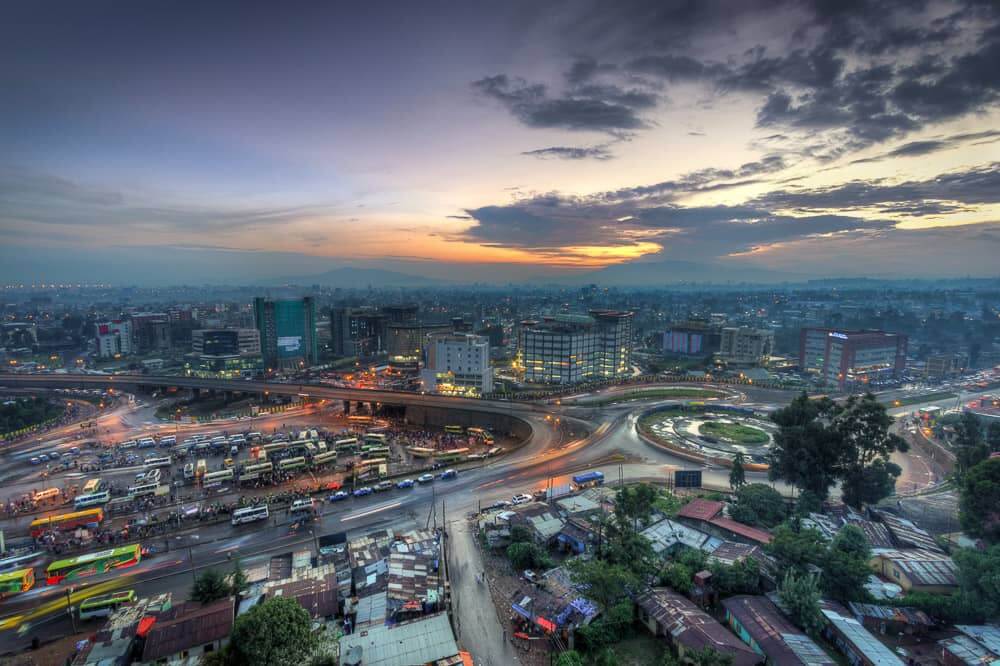
Economic Development
Over the years, the city has witnessed significant economic growth, transforming into a vibrant metropolis. The construction boom is evident with numerous skyscrapers and modern infrastructure dotting the cityscape. The city’s economy is primarily driven by trade, manufacturing, and services, with a growing emphasis on information technology and telecommunications.
The Bole area, near Bole International Airport, is a hub of commercial activity. It houses several upscale hotels, shopping malls, and business centers, making it a prime location for both business and leisure travelers. Additionally, Addis Ababa hosts the Addis Ababa Stock Exchange, playing a crucial role in the financial sector’s development.
Addis Ababa as a Diplomatic Hub
Addis Ababa is often referred to as the “Political Capital of Africa” due to its significant role in continental and international diplomacy. The city is home to the African Union (AU) headquarters, where critical decisions affecting the continent are made. This status as a diplomatic hub attracts numerous international organizations and foreign missions, fostering a diverse and cosmopolitan environment.
The United Nations Economic Commission for Africa (UNECA) is also headquartered in Addis Ababa, further cementing its position as a key player in global economic discussions and policies. The presence of these institutions has led to a steady influx of diplomats, policymakers, and international professionals, contributing to the city’s dynamic atmosphere.
Challenges and Opportunities
Urban Challenges
Addis Ababa, like many rapidly growing cities, faces a range of urban challenges. As the capital and largest city of Ethiopia, it is grappling with issues related to rapid urbanization. The influx of people seeking better opportunities has put a strain on the city’s infrastructure and resources. Housing shortages and the proliferation of informal settlements are prominent concerns, as they lead to overcrowding and inadequate living conditions for many residents.
Traffic congestion is another significant issue, exacerbated by the city’s expanding population and increasing number of vehicles. Despite improvements in public transportation, such as the introduction of the light rail system, traffic jams remain a daily challenge for commuters.
Environmental concerns are also pressing, with issues such as waste management, air pollution, and green space preservation requiring urgent attention. The city’s waste management system struggles to keep pace with the volume of garbage produced, leading to sanitation problems and health risks. Additionally, air quality has been affected by vehicle emissions and industrial activities, posing a threat to public health.
Future Prospects
Despite these challenges, Addis Ababa has numerous opportunities for growth and development. The city’s strategic location and status as Ethiopia’s political, economic, and cultural hub provide a solid foundation for future progress. Urban planners and policymakers are actively working on comprehensive plans to address the city’s challenges and harness its potential.
The ongoing expansion of infrastructure projects, including road networks, public transportation, and housing developments, aims to improve the quality of life for residents. These initiatives are designed to enhance mobility, reduce congestion, and provide affordable housing solutions.
Economic diversification is also a key focus, with efforts to promote sectors such as technology, manufacturing, and tourism. The city’s vibrant cultural scene and historical significance make it an attractive destination for tourists, which can stimulate local businesses and create employment opportunities.
Visiting the capital and largest city of Ethiopia
Tourist Attractions
National Museum of Ethiopia
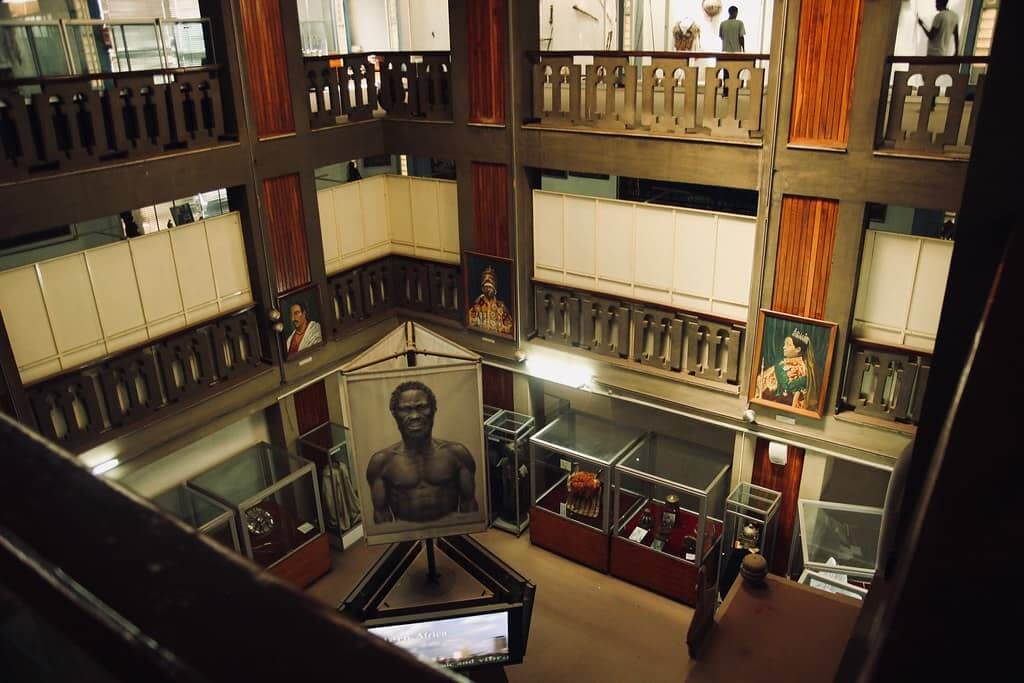
The National Museum of Ethiopia is home to the world-famous fossilized hominid skeleton known as “Lucy,” a key piece in the story of human evolution. The museum’s extensive collection includes artifacts from Ethiopia’s rich and diverse history, ranging from prehistoric times to the modern era. Exhibits cover various aspects of Ethiopian culture, including ancient tools, traditional clothing, and religious icons. A visit to this museum provides a comprehensive understanding of Ethiopia’s historical and cultural journey.
Meskel Square
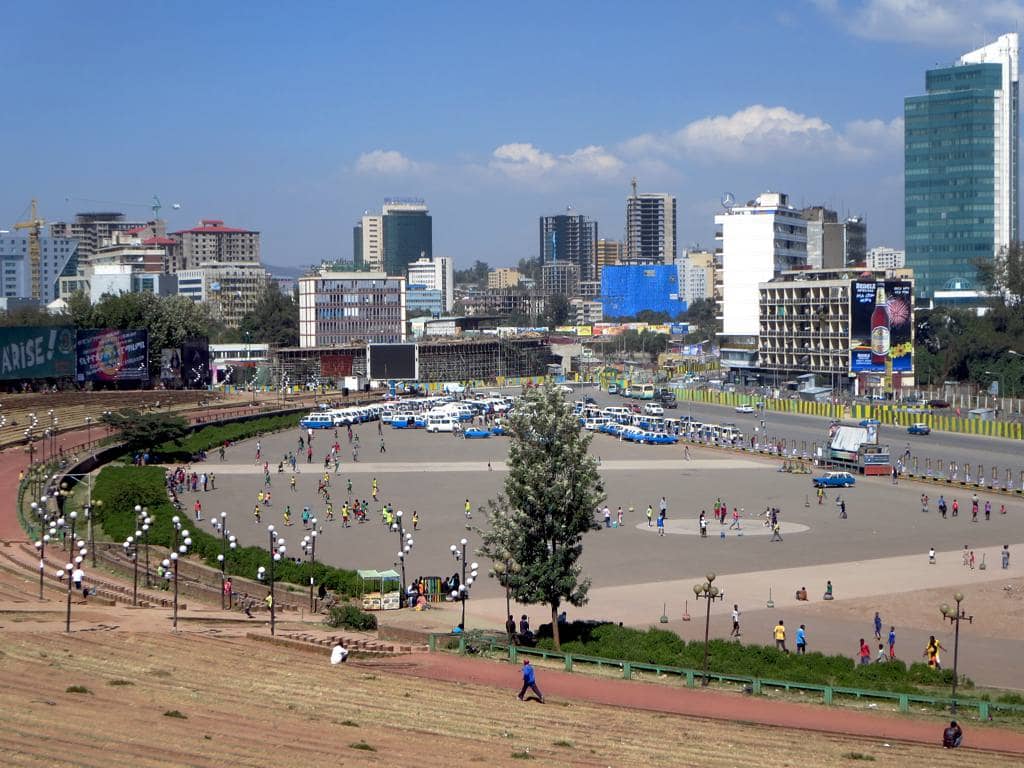
Meskel Square is the bustling heart of Addis Ababa, serving as a central venue for public gatherings, events, and festivals. Named after the Meskel festival, which celebrates the discovery of the True Cross, this square is a vibrant spot where you can experience local culture firsthand. During the Meskel festival, thousands gather to participate in traditional ceremonies and bonfire lighting. Even on regular days, the square is alive with activity, offering a glimpse into the daily life of the city.
Holy Trinity Cathedral
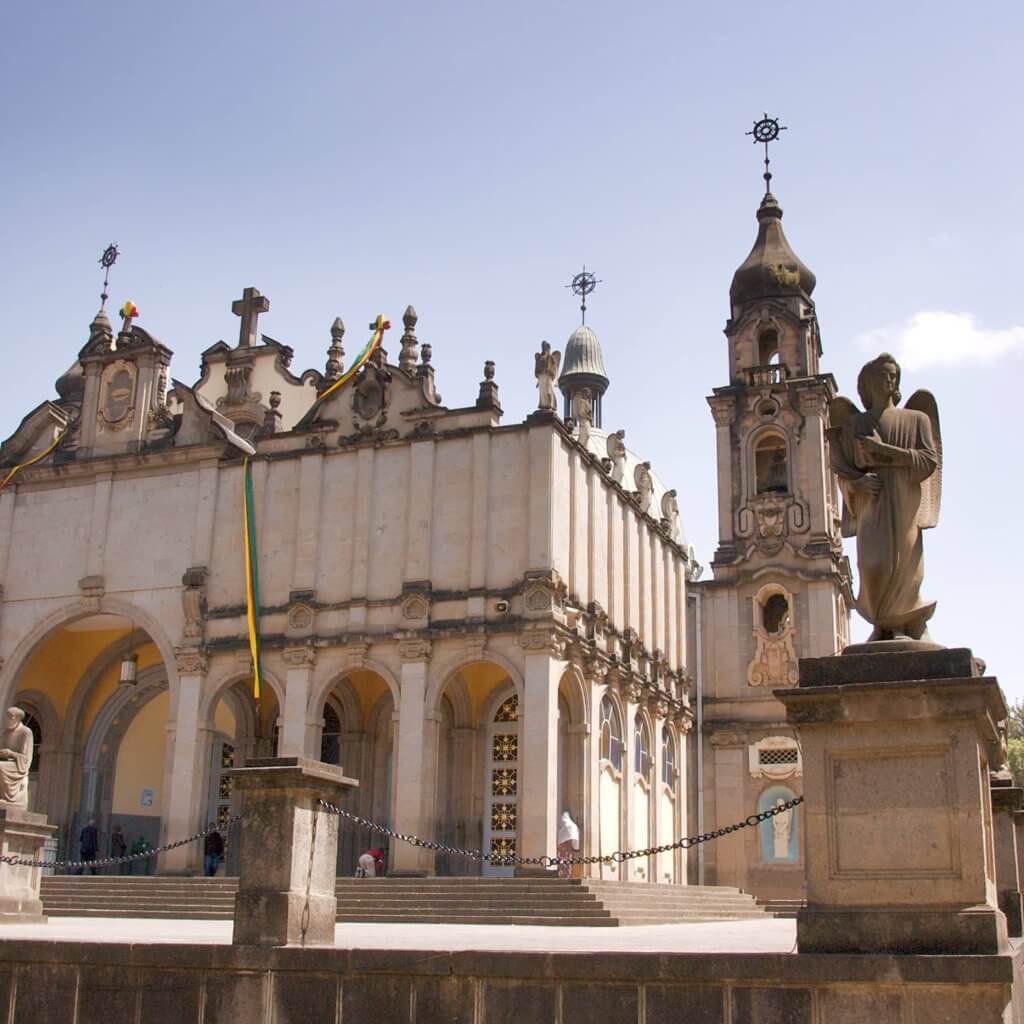
Holy Trinity Cathedral is one of the most significant religious sites in Ethiopia. This stunning cathedral is the final resting place of Emperor Haile Selassie and Empress Menen Asfaw. The cathedral’s impressive architecture features grand domes, intricate carvings, and beautiful stained glass windows. Visitors can also explore the tranquil gardens and the adjoining museum, which houses religious artifacts and memorabilia related to the Ethiopian Orthodox Church.
Entoto Hill
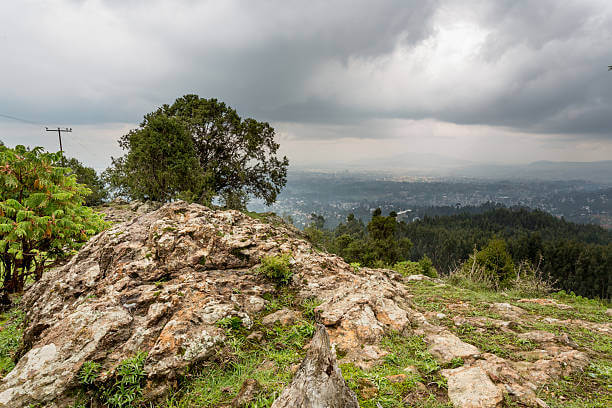
Entoto Hill offers breathtaking panoramic views of Addis Ababa and its surroundings. Historically significant, this hill was once the seat of Emperor Menelik II before he established Addis Ababa as the capital. The area is home to the Entoto Maryam Church, an important religious site, and a museum displaying artifacts from Menelik II’s reign. The hill is also popular for hiking and offers a serene escape from the bustling city below.
Addis Ababa University and Ethnological Museum

Located in the former palace of Emperor Haile Selassie, Addis Ababa University is home to the Ethnological Museum. This museum provides an in-depth look at Ethiopia’s diverse cultures through its extensive collection of traditional artifacts, religious items, and art. The exhibits are organized by theme, covering aspects such as music, religion, and daily life, offering visitors a comprehensive understanding of Ethiopia’s rich cultural heritage.
Merkato
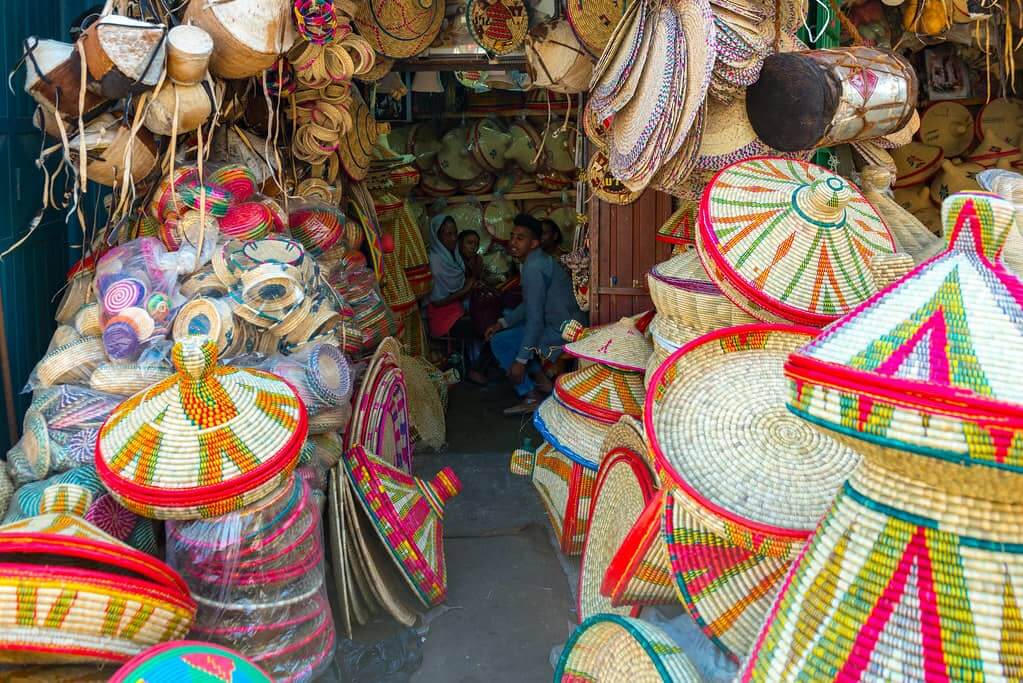
Merkato is one of the largest open-air markets in Africa and a must-visit for those looking to experience the vibrant hustle and bustle of Addis Ababa. Here, you can find everything from fresh produce and spices to handcrafted goods and textiles. The market is divided into sections, each specializing in different products, making it a fascinating place to explore. It’s also an excellent spot to practice your bargaining skills and immerse yourself in the local culture.
Tips for Travelers
Stay Safe
While Addis Ababa is generally safe for tourists, it’s essential to remain vigilant, especially in crowded areas like Merkato. Keep your personal belongings secure, be aware of your surroundings, and avoid walking alone at night in unfamiliar areas. Using reputable taxi services and being cautious with your valuables can help ensure a safe visit.
Plan Ahead
While Addis Ababa is generally safe for tourists, it’s essential to remain vigilant, especially in crowded areas like Merkato. Keep your personal belongings secure, be aware of your surroundings, and avoid walking alone at night in unfamiliar areas. Using reputable taxi services and being cautious with your valuables can help ensure a safe visit.
Respect Local Customs
Ethiopia has a rich cultural heritage, and it’s important to respect local customs and traditions. Dress modestly, particularly when visiting religious sites, and always ask for permission before taking photos of people. Learning a few basic phrases in Amharic, the official language, can also be appreciated by locals.
Try Local Cuisine
Ethiopian cuisine is renowned for its unique flavors and communal dining style. Don’t miss the opportunity to try traditional dishes like injera (a sourdough flatbread) and doro wat (spicy chicken stew). Addis Ababa boasts a variety of restaurants offering both traditional and modern Ethiopian dishes, providing a culinary adventure for every palate.
Transportation
Navigating Addis Ababa can be challenging due to traffic congestion. It’s advisable to use reputable taxi services or consider hiring a guide or driver if you plan to visit multiple sites. The city’s light rail system is also a convenient and affordable option for reaching key areas. Plan your travel routes in advance to avoid delays and ensure a smooth journey.
Conclusion
Addis Ababa stands as a vibrant and dynamic capital, offering a unique blend of historical significance and modern development. This bustling city invites visitors to explore its rich cultural heritage through iconic landmarks, such as the Holy Trinity Cathedral and the National Museum of Ethiopia, while experiencing the lively atmosphere of markets like Merkato. As Ethiopia’s political and economic hub, Addis Ababa also plays a pivotal role in international diplomacy, hosting significant institutions like the African Union. Despite facing urban challenges, the city’s ongoing development and modernization efforts highlight its resilience and potential. For travelers seeking an immersive and enriching experience, Addis Ababa promises a journey through the heart of Ethiopia’s past, present, and future.
Frequently asked questions
-
What is Addis Ababa?
Addis Ababa is the capital and largest city of Ethiopia. It is a vibrant African city located in the heart of the country.
-
Where is the Bole International Airport located?
The Bole International Airport is situated in the city of Addis Ababa and serves as the main airport for both domestic and international flights.
-
Can you provide information about the National Museum of Ethiopia?
The National Museum of Ethiopia is a must-visit attraction in Addis Ababa that houses many significant artifacts and exhibits showcasing the rich history of the country.
-
What are some of the international organizations based in Addis Ababa?
Addis Ababa serves as the headquarters for organizations like the African Union and the United Nations Economic Commission for Africa, solidifying its position as a diplomatic hub.
-
Where can I find the National Library in Addis Ababa?
The National Library is a prominent institution in Addis Ababa, housing a vast collection of books and resources that reflect the cultural and literary heritage of Ethiopia.
About Author
Introducing Noah Mohamed, a seasoned expert in both SEO and PPC, who has dedicated the last 5 years to mastering the intricacies of digital marketing. Noah’s approach is data-driven and results-oriented, focusing on maximizing return on investment for PPC campaigns while building sustainable organic growth through SEO. His ability to analyze market trends and adapt strategies accordingly makes him an invaluable asset to our team and clients alike.
Subscribe to stay up-to-date with Ethiopia
Get the Free monthly newsletter



